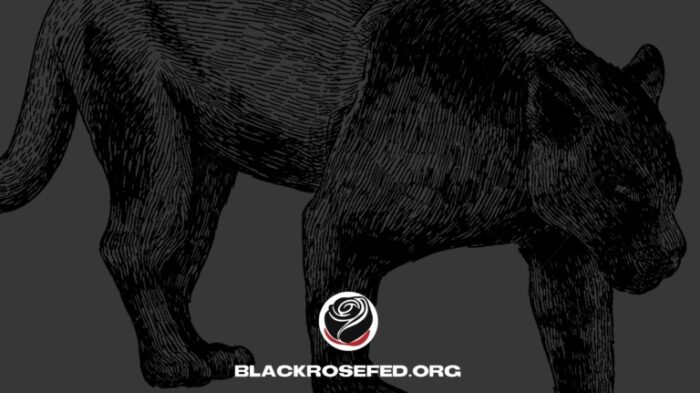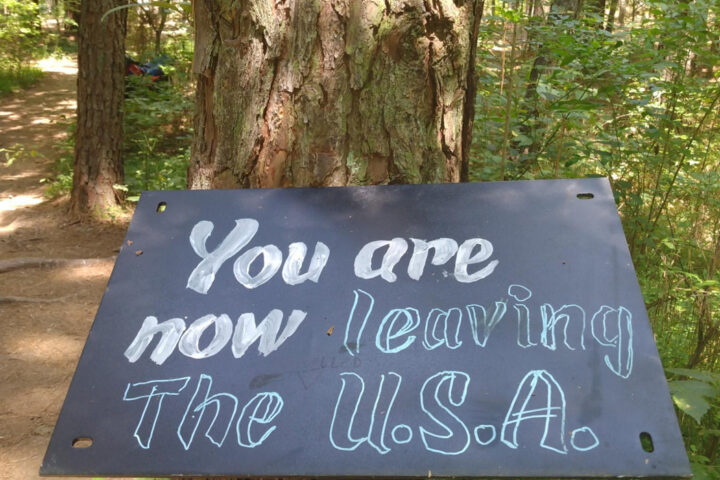From: https://blackrosefed.org/ungovernable-interview-lorenzo-komboa-ervin-anderson/
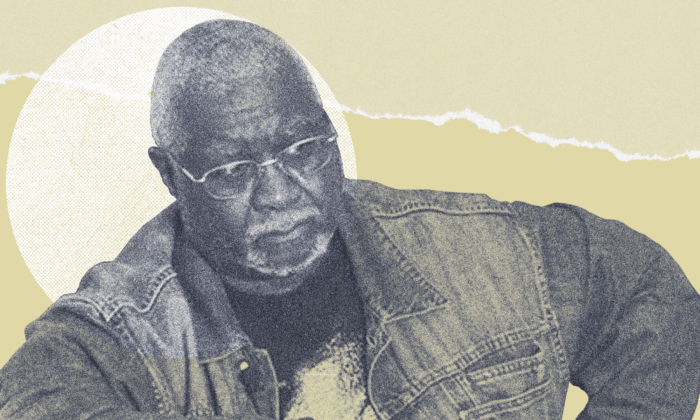
Author and independent writer William C. Anderson interviews veteran organizer and former Black Panther and political prisoner Lorenzo Kom’boa Ervin on the current political crisis, fascism and rising relevance of Black anarchism. We also urge you to generously contribute towards a fundraising campaign organized by William to support Lorenzo and his partner JoNina Ervin. Both are movement elders who’ve inspired generations of rebels and are in need of support with their living and medical expenses.
Introduction and Interview by William C. Anderson
The novel coronavirus, also known as COVID-19, has highlighted the daily disasters of capitalism. A lack of healthcare, a safe environment, housing, and food are an everyday question for a growing segment of vulnerable people. This has brought about a noticeable interest in anarchism for many. The failures of the state were made plain by ineffective solutions, willful neglect, and utter disregard for human life. It exposed deeper questions (for some) about the plausibility of statist solutions. In concert with all this, authorities began to take notice, evidenced by its mounting attacks and scapegoating of anarchists. President Trump and many others seemingly identified a set of politics they found threatening and worthy of blame. This is no coincidence and it follows a historical pattern.
As usual, anarchism was denied its complexity by shallow, willful misreadings. The intricacy of various sets of anarchist politics, principles, and approaches were reduced to the trope of the terroristic bomb-thrower. Even as anarchists organize and take part in mutual aid projects around the country during this pandemic, this is not what anarchism represents to many people. In the midst of a global pandemic, the effectiveness of these sorts of projects paired with other survival programs has become especially relevant. Although, for opponents, so did the necessity to attack these politics from all sides. Still, growing interest in Black anarchism has remained undeterred.
Black anarchism has long been sustained by the works of often overlooked thinkers and revolutionaries. Among them is Lorenzo Kom’boa Ervin. I first met Lorenzo in 2012 at an organizing workshop I helped lead alongside different organizers across the South. My friend (who’d come up with the idea) invited Lorenzo to speak based on the recommendation of someone she knew. It didn’t take long for Lorenzo and his partner JoNina Ervin to make the truths of anarchism clear to me. It started me on my journey to fully embracing Black anarchism.
Lorenzo has lived a revolutionary life to say the least. After being introduced to anarchism by Martin Sostre, a jailhouse lawyer that was one of the architects of the prisoner’s rights movement as we know it, he’s had to battle and flee U.S. authorities more than once. He’s lived all over the world while teaching and organizing. These are just some of the reasons it’s important to hear his insights about the current predicament we’re facing.
I spoke with Lorenzo about Black autonomy, fascism, and what’s needed as we confront the crisis.
This interview has been edited for brevity and clarity.
William C. Anderson (WCA): What do you think about the current uprisings happening throughout the country in response to police violence?
Lorenzo Kom’boa Ervin (LKE): I think the uprisings are good but we’re seeing that they have limitations as a revolutionary uprising. These limitations allow the state to subvert the nature of uprisings as well as the issues as mere reforms. The state and the liberal politicians and others are able to utilize that against the movement. This kind of cooptation has been happening for a while. I’ve watched 60 years of protests and so-called “riots” and rebellions and uprisings in major cities and small towns like Ferguson, Missouri. I’ve watched 60 years of them going back to 1964 with the Harlem rebellion in Harlem, New York. It was always something to do with the police. One form or another, they kill somebody, beat somebody, or just came in the community and did some kind of atrocity. And the people responded with a fight back. What’s been allowed to happen in this instance is that the people rebel, the people fight back, and people put up a mass front of protests. Then the politicians and the others claim to be using their issues or their drive to then turn around and propose some liberal reforms, which aren’t liberal at all, actually.
What we see is that each time the police terror or racism becomes worse or it just becomes prolonged. So we have to ask ourselves, “Okay we’re having protests. We’re going up against the man. But are we also not understanding that the role here now is to transform the society as a whole?” We’re not trying to just get some “defund the police” or whatever. The government is not giving anything, and even with the protests pressuring them, they have yet to come up with anything in terms of any kind of program to prevent further atrocities against Black people. There have been thousands of people killed by the police in the United States and the government has given impunity to the killer cops.
This is a form, in my estimation, of class warfare or fascist policing, and we need to understand that. They are using the most violent statist agents, especially in the Black community and in poor communities. They are using them to beat down any grassroots political opposition as well. They’re using them to create a new kind of criminal system where they are summarily charging people and putting them in prison for long periods of time with draconian sentences. And this has been going on for quite some time. So, rebellions are great. They’re wonderful, it’s great to see people standing up. The only thing is, you know my standpoint as an old long-term activist and everything, I try to look at the actual essence of a struggle, not just the fact that it’s happening. The orientation of the struggle today is very similar to what I saw in the final stages of the civil rights movement. You see them win reforms, but not transform the system itself. That’s the difference between revolutionaries and reformers, we want to smash the state entirely.
We can’t organize the way we organized back in the 60s, we can’t organize the way we organized even 30 years ago, 20 years ago. We’ve got to break new political ground and have new political theory and new political tactics.
WCA: What sort of advice would you have for young radicals then who want to transform this society? What advice do you have for those who are politicized and looking for some direction on how to go about doing the things you think need to be done?
LKE: We as activists, as organizers, have to make ourselves and our communities ungovernable. I know you’ve heard that term before. That means what it says. We have to make it so that we create a new kind of political system of our own, whether it’s dual power or revolutionary direct democracy, whatever we want to call it in this period. We need to create that kind of movement, a mass anti-fascist movement on one hand. And on the other hand, we need to have the capacity on a mass scale to build a community-based mass economic survival tendency, based on cooperatives in the ghetto for housing the poor, rebuilding the cities, and taking care of the material needs of the poor. We need to be able to build that. I’m not opposed to some of these groups that are coming about because although not now radical, potentially they could turn into something else. But what needs to happen is that we need to be reaching the masses of urban poor people with these programs. We’re not fighting just to have a cult or a group, or some leaders. We’re fighting to put power in the hands of the people in a new society. Presumably, revolutionaries know some things in some areas of organizing that people don’t know. So we need to be training them, we need to be equipping them to be independent of this political structure. I also think the Black Panther Party was right, we need to have survival programs and we need to be going beyond just what they had. We should be trying to build the survival economy in this period right now.
We should go from this period where there are some people who understand or are practicing mutual aid, but the masses do not. So we need to go beyond “just helping,” to working toward some sort of different economy, a survival economy on the way to full on anarchist communism. Maybe that’s the name we know of, as anarchists, but in some parts of the world, they call it a “solidarity economy” to help them survive capitalism. Whatever it’s called, we need to have that so we’re not totally dependent on the capitalist state. I don’t claim to know it all, but I do know some things and I know one thing that’s not going to work—is when you allow the same corrupt, racist cops to claim that they’re reformed now or you got the same politicians claiming “Well, this is not the same system, we’ve never found a way to defund the police, but we’re reorganizing it, so be patient!” George Jackson, a radical prisoner in California and member of the Black Panther Party in the 1960’s, himself, said that such police or prison reforms are nothing but the further rise of fascism. They help fascism become acceptable to the people.
We’ve dealt with that for years because you see how the police have been using different kinds of psychological warfare and pseudo campaigns like Weed and Seed, or community policing over the years. That stuff was designed to put the police in power over the community. They were intentional racial profiling and control measures, and we need to understand what’s been happening up to this point. This stuff with Trump is just the culmination or the end stage of their building of fascism. They built the prison system which is the biggest in the world. They built that back years ago. They started using paramilitary policing years ago, especially in the Black community. All these things that we see, these forms of what would constitute a fascist state in another country, they don’t have to build it. They’ve already got segments of it built in America.
You have to ask yourself some critical questions like how is this ever being allowed to happen at a time when you’ve got all these so-called anti-racist, anti-fascists in name. But they even don’t do anything to deal with this kind of fascist struggle against itself. They go and get in the street and fight some drunk Nazi, some low grade kind of organizing campaign. We need more than that in this period, now coming up especially. We need the ability to have a mass base, not just youth but communities, a broad segment of the people. We need that mass base added to a new kind of politics where the people are being put in control, rather than the politicians or preachers or whomever all these people they’ve chosen. Tell the youth to build movements from the grassroots up. Build resistance movements and build a large enough movement that cannot be controlled by the state so that, as I said before, it’s ungovernable. And ungovernable means a number of things to people in the movement right now: it means the kind of tactics you engage in in the street, it means how the community is organized that they don’t have to depend on these politicians, it means a mass boycott of capitalist corporations, a new transitional economy, and many others things as part of a resistance.
One thing I’ll be most anxious to say to people is we can’t organize the way we organize back in the 60s, we can’t organize the way we organized even 30 years ago, 20 years ago. We’ve got to break new political ground and have new political theory and new political tactics. These don’t come from one person or group alone, it must be decided by the people themselves.
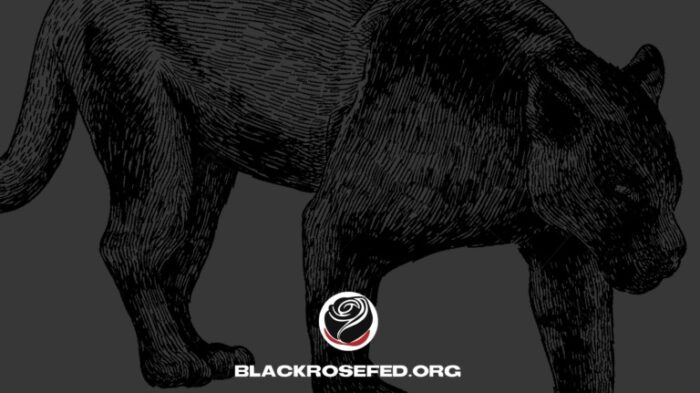
WCA: Can you talk a little bit about why you started Black Autonomy, what it is?
LKE: Black Autonomy was something I started to try to deal with the fact that inside the anarchist movement, there were very few black people. Black Autonomy was designed also to be a pressure group against the institutionalized racism within the anarchist movement. At that time, white anarchists in the USA were not really relating their political direction to the Black community or interested in Black organizers. Truthfully, it was not really a true anti-racist movement in that period. And I eventually reached the stage where I said what we will have to do is create an African American/Black tendency within the anarchist movement that is strong enough to stand on its own. And that can challenge the white fixed nature of the anarchist movement. That was the same reason I started writing Anarchism and the Black Revolution, which was a book that raised the contradictions around race and colonialism and oppression, and called for Anarchists to raise their consciousness. They had never looked at it as a problem or issue before; they never thought about Africans or Blacks in America at all unless they were merely trying to recruit Black people into their tendencies, but even that was not happening when I came along in the early 1970’s. I was the only Black Anarchist in the USA and even other parts of the world for years, actually decades.
In the United States, Black people’s labor and living conditions have always been different from the white population, going all the way back to slavery. Something that Marx himself has said is the “pedestal” for the creation of capitalism in the USA was Black slavery. I tried to get anarchists to understand and think more critically about it, but they would become very angry and defensive at me for saying. So we created our own ideological construct and organization that wasn’t perfect and it was created under some really tough odds, but we created it. It was in the face of fear, guilt and hostility by white anarchists. They gave Black Autonomy no real support, began to call us “narrow nationalists” and this and that.
We created what was essentially a collective first in Atlanta. You know, myself and I think there were seven other community organizers, and seven or eight students from Clark College and Morehouse University. They became part of this collective right at that time. Eventually the group built a ten city national federation and a group in London.
We were doing political discussions and so forth in Atlanta on the direction we should take. So, the ones from the street said, “Well, look, we gotta be organizing the Black community against the conditions that are happening to us.” And we started organizing around the Atlanta PD police assassination of a brother named Jerry Jones in 1995, and we also started organizing around the attempt by the city government to take the transit system away from the poor and working people inside the city and give it to people in the suburbs. You know they were going to up the transit fare so much that people who lived in the city wouldn’t be able to pay for it. So we started the Poor People’s Survival Movement, a group we had started. And out of that came the Atlanta Transit Riders Union. We were fighting against the authorities that ran the transit system and we began raising contradictions around race, class, and poverty that had existed for years by city authorities. That was a successful campaign. We were able to beat the transit officials back for years against implementing the fare hike. We made the rich, the city government, and corporations underwrite it, instead of poor people or workers who had no other transit options.
Black Autonomy itself was an anarchist organization, but it also understood that its politics were based around the reality of the oppression of Black people in the United States and around the world. We organized around the things that we still see happening today: mass imprisonment of Black people and murderous shootings by the police or fascist vigilantes. We have been organizing in a number of cities in the 1990s and even in the 2000s. The 2013 anti-klan demonstration in Memphis, Tennessee was the largest anti-fascist demo that year with 1,500 to 2,000 people. We had been organizing a number of cities against police terrorism for years as well.
So Black Autonomy also started organizing and trying to create a dual power political structure trying to create ideas that can reach the youth and trying to combat prisons as an entity. Not just combating judges and all this other garbage, but actually dealing with the prisons being used as a tool of oppression of Black and poor people. And unfortunately, we weren’t able to get enough forces around us on that question to build a broad based movement against mass imprisonment. We tried to get groups like the Anarchist Black Cross to help us, but we failed when they united with the authoritarian left.
WCA: Why do you think the current administration is honing in on anarchists and Antifa (Anti-Fascists)?
LKE: Trump needs a scapegoat for one thing. Antifa are willing to combat these fascists in the street and they have been doing so for quite some time. So Trump’s able to utilize that “violence” to justify his policies, and he’ll become more repressive about it as time goes by. I really do think he wants to prosecute them in federal court for “treason.” They want to project Antifa as “enemies of the state.” I think he would have used the DOJ and his federal goon squad to try to smash them by now, if it were not for the fact that he has had to run for office and he has not had a totally free hand. And also, I think that he believes, and to some extent it may be true, that a lot of the stuff that’s happening in the street is by anarchists that seem to have mass support.
The thing is, for almost 100 years, the government has always seen anarchists as a serious threat for disruption. In years past, there have always been waves of repression of anarchists. But in recent years, anarchists haven’t been exactly doing very much that would warrant this kind of repression. I’m surprised that it’s coming now but I’m not surprised in one sense, because we are a convenient scapegoat as the most dangerous tendency on the left. The communists? Oh the communists are all sold out! (laughter) They’ve all sold out and they’re running for office or whatever. And to some extent (laughter) that’s true to be quite honest. I’m not saying in every instance, but you have got a lot of communist elements that are in bed with the state and in bed with the capitalists right now.
The Department of Justice and FBI want to scapegoat the Black protest movement. They haven’t been able to do it with the Black movement yet, although, you know, they came up with this so-called state security program some time back where they were going to go after Black activists, you know, “extremists.”
“The protest movement is pushing the government back, pushing it up against the wall, but it’s not choking the life out of it. What we need is the kind of revolutionary movement that can choke the life out of it and create a new society all together.”
WCA: “Black identity extremists.”
LKE: That’s exactly what they called it, and they tried to use it for intimidation, but for whatever reason they weren’t able to get the public support to that extent. He wants to do it with Black Lives Matter. But I think a lot of people have been convinced now that Black Lives Matter is just using non-violent tactics. So the American people are not so much in favor of the idea of the state or the government coming after them like that. It may still happen before or after he leaves office, if the Black protest tendency becomes more radical or switches tactics.
WCA: I wanted to ask you about the increasing popularity of Black anarchism. There are a lot of Black people who are becoming more interested in anarchism. A lot of these Black people are getting interested in your work. Can you speak about this and why you think it’s happening? And can you also kind of speak to what you will hope that they get out of your work and Black anarchism?
LKE: First, it was a surprise to me to even find out that there were new anarchist tendencies, Black anarchist tendencies, on the scene. And I only found that out in the last year, this year actually. But on the one hand that speaks to the work we did with Black Autonomy. Whatever mistakes we made and our failure to build a mass tendency years ago, it speaks to that work. I think if I hadn’t written Anarchism and the Black Revolution and done other things that I did with the comrades that I worked with, people wouldn’t even know about the ideas of Black Anarchism.
The other thing is, I stand for a type of anarchism that’s a class struggle anarchism. My perspective and my understanding going back reading years ago is that anarchism comes from the socialist movement. It is in fact self-governing socialism or libertarian socialism. The ideas of self-governing socialism and all this came from Bakunin, and the anarchist movement was part of the first international communist movement. So my thing is, if people are going to want to get an anarchist perspective or Black anarchist politic, they have to understand that we have to build a movement that’s about struggling for power to the people. That’s not just a term of art, but we are fighting not to just have a party or cult or some leadership. We’re fighting so the people on the ground, on the bottom, can begin to build a new life for themselves and a new society. There’s all kinds of debates on what that society could look like or what transitional stages of fighting and building a new society we have to go through.
I do believe we’ll have to go through a transitional stage. But at this point, at this moment, it is about revolutionary community organizing, not just “peaceful protests” to appeal to the government. We must adopt new thinking about resistance and rebuilding communities so that we can be ungovernable by the state. We have to think about people building revolutionary communes and building other forms of independent political entities. Right now we have to think about millions of homeless people coming, and talk about how we give them some place to live. How do we deal with the government to force them to provide those resources and, how do we fight the government to take over housing entirely? We’re going to have to do widespread fight back in the form of squatting or just going in physically taking over buildings. With the kind of class warfare that exists in the United States, you will have to pick up the gun if you want to change society. I mean, I’m not saying using armed struggle as a only tactic, but the revolutionary civil war is coming inevitably. The government will make war on you, whether you are ready for war or not.
I acknowledge a mass tendency which uses non-violence at a certain historical stage can push the government back, and that’s what’s happening right now. Yes, the protest movement is pushing the government back, pushing it up against the wall, but it’s not choking the life out of it. What we need is the kind of revolutionary movement that can choke the life out of it and create a new society all together. These organizations we’re talking about, are stifled by petty bourgeois consciousness, petty bourgeois organizing, petty bourgeois leadership and so forth creates a certain kind of movement. A certain kind of movement that will not go to the point of “going for it all” as they used to say back in the day. I really think that they have built in limitations on their ability or their willingness to overthrow the state or even talk about it. The funny thing is, we have to continue to think about things just like that, overthrowing the state, not getting some reforms. I’m not gonna tell you that you never should get reforms if you can in the immediate sense. But at this stage, we’ve gone too far now to just settle for this reformism over and over again especially in this moment. This moment is a revolutionary moment and other things have happened to make it that way, not just the protests.
The system itself is tottering because of the COVID virus and everything that’s happening with Wall Street. All these things are happening and it puts the state on the weakest point it ever has been. Even Trump or whomever taking over the state and trying to create a fascist state is not doing it from a position of strength. They’re not trying to impose dictatorship from a position of strength, they’re trying to impose it from a position of weakness, and fear. So that’s why I said we have to build an alternative, radical force, so that it can then work in a way that it never has before to overthrow the entire system. Not just the Democrats or the Republicans—you know the rulers want that sort of bullshit. They want it, because it’s trivial. It means nothing whatsoever. In the final analysis, Trump may want a personal dictatorship. But the other guy [Biden], he’s an agent for the state and he’s an oppressor in his own right. He’s helped to get the prison system to the point where it is. His running mate, Kamala Harris,—well she is just as much of an establishment Democrat as he is. She’s just as much in favor of using the police and the government against the poor. We need to be able to educate masses of people about these things while we’re creating an alternative, so they will not be fooled. We need a new society and a new world, not more capitalism.
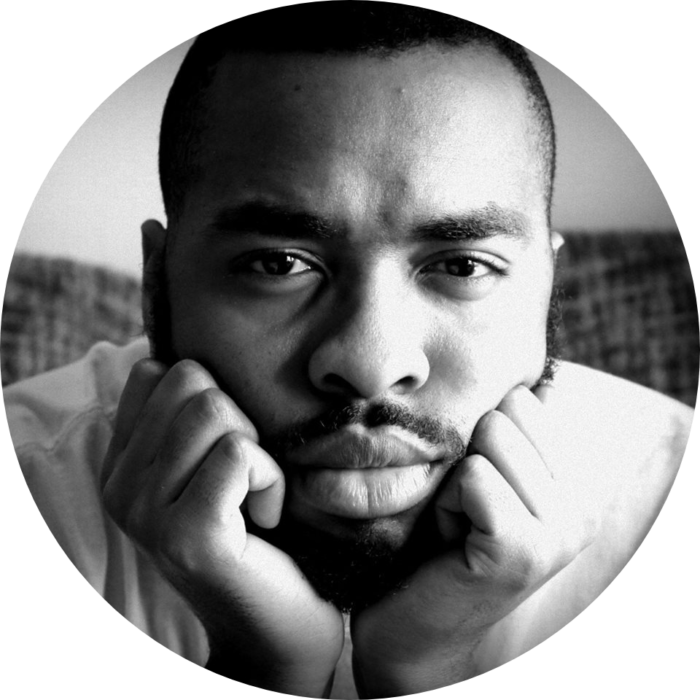
William C Anderson is an independent writer from Birmingham, Alabama and co-author of As Black as Resistance (AK Press, 2018).
If you enjoyed this interview you can find more of Lorenzo Kom’boa Ervin‘s writings in “The Black Anarchism Reader.” We also recommend this review of a recent biography on Lucy Parsons, “Don’t Throw Lucy Parsons’ Anarchism Under the Liberal Bus.”

